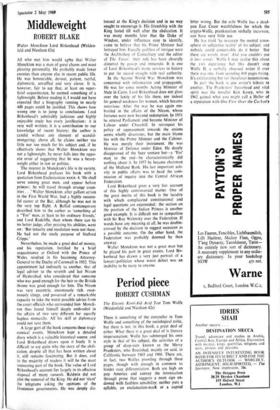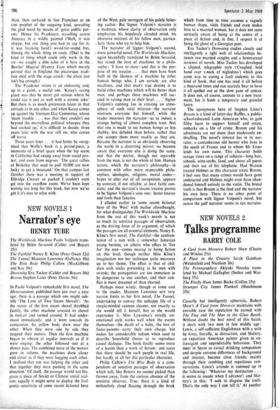Period piece ROBERT CUSHMAN
The Electric Kool-Aid Acid Test Tom Wolfe (Weidenfeld and Nicolson 42s)
There is something of the storyteller in Tom Wolfe and something of the sociological critic, but there is not, in this book, a great deal of either. What there is a great deal of is literary impersonation; Wolfe has submerged his own style in that of his subject, the activities of a group of drop-outs known as the Merry Pranksters, who flourished, mainly on acid, in California between 1963 and 1966. There are, in fact, two Wolfes prowling through these pages, though with enough in common to hinder easy differentiation. Both are high on pop America and convey the intoxication through prose that suggests a neon sign en- dowed with faultless sensibility; neither puts a syllable, an exclamation-mark or a capital letter wrong. But the echt Wolfe has a dead- pan East Coast watchfulness for which the crypto-Wolfe, pranksterism verbally incarnate, can have very little use.
He has tried `to re-create the mental atmo- sphere or subjective reality' of his subject. and nobody could conceivably do it better. 'But these are words, man! And you couldn't put it into words.' Wolfe I may realise this about the LSD experience but this doesn't stop Wolfe 11. a verbally obsessed writer if ever there was one, from spending 400 pages trying. It's exhilarating but (or therefore) monotonous.
In part the book is one writer's tribute to another. The Pranksters' figurehead and vital spirit was the novelist Ken Kesey, who in 1962 gained what you might call a Heller of a reputation with One Flew Over the Cuckoo's Nest, then surfaced in San Francisco as an LSD prophet of the outgoing kind, spreading the glad word by means of 'great public put- ons.' Hence the Pranksters, travelling across America in a wildly painted ('Well, it was sloppy, but one thing you had to say for it; it was freaking lurid') wired-for-sound bus, filming the whole thing en route. (That is the kind of thing which could only work in the us—we caught a dim echo of it here in the Beatles' Magical Mystery Tour which merely proved that in England the picaresque tradi- tion died with the stage coach—the place just isn't big enough.) The Prankster vision is an endearing and, up to a point, a useful one. 'Kesey's saving grace was that he never got serious where he could say it just as well with a cosmic joke.' But there is as much pretension latent in that attitude as in any other, and when Kesey comes
• up against the Vietnam Day Committee, whose 'main trouble . . . was that they couldn't see beyond the marvellous political whoopee they had cooked up,' it is difficult to decide, three years later with the war still on, who comes off worse.
Three years later . . . it had better be recog- nised that Wolfe's book is a period-piece, a memento of a brief space when the hip scene in California had swung away from social pro- test, and even from negroes. 'The great rallies at Berkeley that used to pull 10,000 are now lucky to get a thousand.' On that campus last October there was a meeting in support of Eldridge Cleaver so packed I couldn't even get into the overflow room. We've been kept waiting too long for this book, but now we've got it it's nice to relax with.



































 Previous page
Previous page